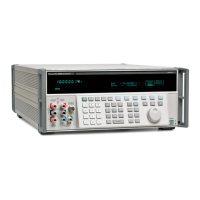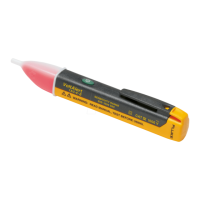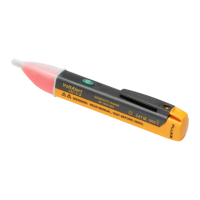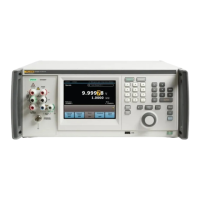Remote Operation
Commands 5
5-39
Table 5-2. Commands (continued)
SP_SET?
Description Sequential command.
Returns the serial port settings contained in nonvolatile memory.
Response 1. (Integer) One of these baud rates: 110, 300, 600, 1200, 2400, 4800, 9600, or 19200
2. (String) TERM or COMP (Response type)
3. (String) XON, RTS, or NOSTALL (Stall method)
4. (String) DBIT7 or DBIT8 (Data bits)
5. (String) SBIT1 or SBIT2 (Stop bits)
6. (String) PNONE, PEVEN, PODD, or PIGNORE (Parity)
7. (String) CR, LF, or CRLF (End-Of-Line)
Example: 9600,TERM,XON,DBIT8,SBIT1,PNONE,CRLF
SP_TIME
Description Sequential command, ignored if not in remote.
Sets the timeout period for the RS-232-C serial interface. (Timeout is the time the interface
waits after being stalled before aborting the communication session.) The timeout setting is
saved even when the power is turned off.
Parameter 0, No timeout
1 to 30, Timeout period in seconds
SP_TIME?
Description Sequential command.
Returns the timeout period for the RS-232-C serial port. Timeout is the time the interface
waits after being stalled before aborting the communication session.
Parameter None
Response 0, No timeout (the interface will wait forever)
1 to 30, Timeout period in seconds
*SRE
Description Sequential command.
Loads a byte into the Service Request Enable register (SRE), described under "Checking
the Calibrator’s Status."
Parameter The decimal equivalent of the binary number to load into the register.
Example: *SRE 56
Enables bits 3 (IIR), 4 (MAV), and 5 (ESR) in the Service Request Enable register.
*SRE?
Description Sequential command.
Returns the byte from the Service Request Enable register, described under "Checking the
Calibrator’s Status."
Parameter None
Response (Integer) The decimal equivalent of the register byte.
Example: *SRE?
Returns: "56" if bits 3 (IIR), 4 (MAV), and 5 (ESR) are enabled (1) and the rest of the bits
are disabled (0). (See "Checking the Calibrator’s Status" for details.)
